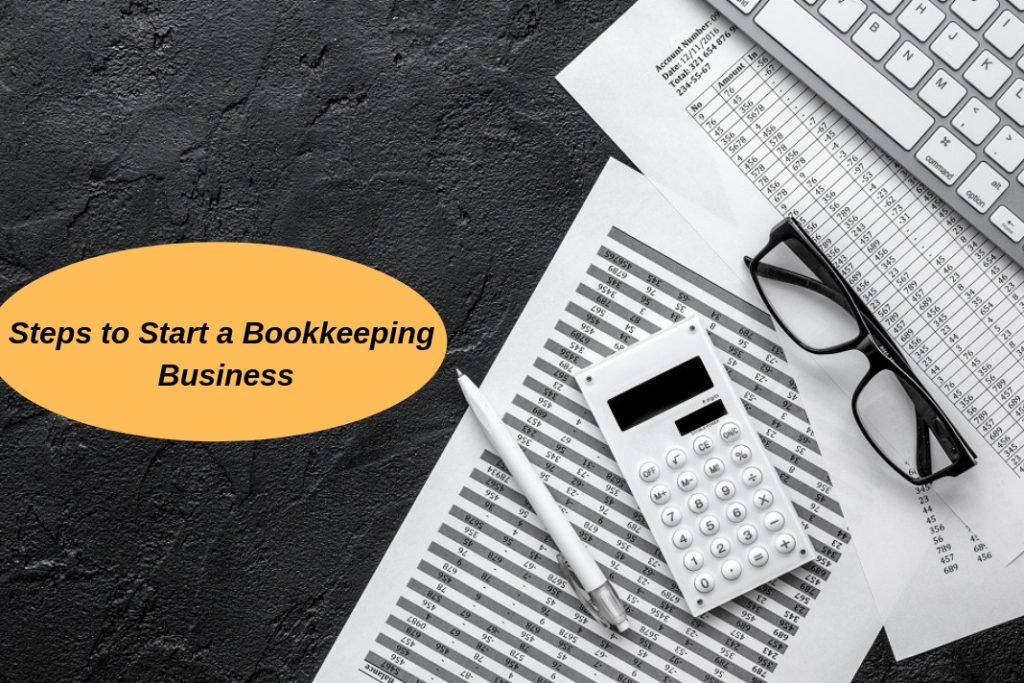
Running a bookkeeping firm is a great idea today because as companies are diversifying their primary functions and exploring new technologies, they are outsourcing secondary yet important business management functions, such as bookkeeping and accounting to third parties. You could be a third-party bookkeeping service provider and earn in millions. You can make this your side hustle or turn it into a full-time career; whatever you wish to choose we suggest that you don’t miss the opportunity if you have the certification and skill.
As a bookkeeper, you will be providing services such as managing income and expenses, preparing tax returns, and prepare your clients for auditing and payroll processing. If you don’t have the necessary skill, do not worry, for in the blog we will share with you everything that is important to start a bookkeeping business.
Follow the steps below and by the end of it, we assure you that you will be able to erect a successful book keeping business.
Be a Book keeper – Get Yourself Certified
One of the great ways to lure clients to choose your services is by showing them that you have the necessary credentials to perform the work.
So, you need to be a bookkeeper yourself. Most of us confuse the terms ‘Bookkeeping’ and ‘Accounting’. They are greatly interchanged; however, they are completely two different qualifications. Even their education is different.
Accountants figure out the taxes of the clients, do the taxes, and help clients file taxes. They also organize financial records, examine financial statement for auditing, evaluate accounting records, and offer insights for saving more money and adhering to state and federal laws.
On the other hand, bookkeepers are involved in day-to-day activities as they often take charge of business’ everyday financial health. Activities include collect payment, pay bills, prepare invoices, update financial records, create reports for tax, check data accuracy, entry financial data in the computer system, and add debit and credit to their corresponding accounts for all transactions accurately.
Now, you can be both or stay just with bookkeeping. It is advisable to provide a comprehensive service to stay competitive. But ultimately, the choice is yours.
You don’t need an extensive qualification to become a bookkeeper. However, you need to gain previous experience, as a freelancer or virtual bookkeeper to run a business. It is essential to learn the nuances of bookkeeping and accounting processes to manage a business all by your own.
CPA license
That being said, having a certification in accounting will give you better opportunities. If you are a CPA, skip to steps below. CPA stands for Certified Public Accountant, a type of license to conduct accounting and auditing for small and large corporations.
If you have a Bachelor Degree in Accounting, we strongly recommend that you take the CPA examination and earn the license. Although it is quite a difficult exam to crack, the credential will increase your earning potential in manifolds.
Certification Courses Available
If you are not a CPA, you should consider getting yourself a certificate. You can earn a bookkeeper certification by enrolling in your country’s or state’s specific program or join online courses. AIPB (American Institute of Professional Bookkeepers) and NACPB (National Association of Certified Public bookkeepers) are two professional and nationally recognized programs that you can consider for your certification.
AIPM is great for someone who does not have formal education in bookkeeping. And, NACPM is for individuals who have a degree in accounting and plan to refine the skill. You can complete AIPM and then apply for NACPM to acquire two credentials.
After you have become a certified bookkeeper, you should complete an Accounting Software certification course so that you are able to serve small businesses. Few of the accounting software programs that are used by billions of SMEs across the world, which you should include in your skills are QuickBooks ProAdvisor, Xero Advisor, FreshBooks, and Zoho Books Advisor.
If you have a CPA license, then accounting software course is not needed.
Steps to Start a Bookkeeping Business
Step 1: Start with a Business Plan
You should consider establishing a business plan if you are considering bookkeeping your full-time business. You could start with a lean business plan. If this is going to be your side hustle, you need not write a business plan.
A business plan will help you obtain funds quickly, clear the steps for the entire development, help you strategize marketing and promotional activities, ascertain the costs, and provide you with the information you need to know about the current market trends, competitors, and risks.
A business plan will act as the written exercise of your business, right from conceptualizing and expansion to next 5-year growth plan.
You have to think about every aspect of your business when writing the business plan. Some of the elements you need to include in your plan are:
- Your business location
- Purpose of the business
- Vision and mission statement
- Products and services
- Clients whom you will serve
- Market analysis
- Competition
- Your brand proposition
- Marketing tactics
- Expenses– rent, bills, software, furniture, equipment, and staffs
- How to gather funds
- Financial projection
- Short and long-term plans
- Break-even analysis
Step 2: Incorporate Your Business Legally
The first administrative task you need to perform is making your business legitimate on papers. Establishing business legally will safeguard your personal assets, like home, jewelry, property, and personal bank account, lest something goes wrong with the business. For instance, if your company is framed legally, only your business assets will be taken away from you.
You need to first select a business structure. Sole proprietorship, Limited Liability Company, Partnership, and Corporation are the commonly formed business structures. The structure you choose will determine your tax liability, your personal liability, and your capital raising ability.
It is recommended that you hire a lawyer who will walk you through with the pros and cons of each structure. Based on your personal situation, your lawyer will suggest the best business structure for you.
Once you have decided a business structure, get it registered at your state’s business administration. You will also have to apply for an Employee Identification Number and Tax ID number if you plan to hire employees and open a bank account.
Step 3: Choose Your Business Name
You have to register your business with a business name. Your business name will convey your brand value and the services you offer. It is the first thing that people use to evaluate a business. Therefore, make sure you put in a lot of effort to come up with a name. We suggest that the moment a business idea strikes, the first thing people should do is start making a list of potential business names.
Your business name should say exactly what you do and leave space for more services. You have to choose ‘Clarity’ over ‘Cute and Fancy’.
Your name should be simple, easy to remember and easy to memorize, and should represent an established term. Get inputs from your friends and family. Make sure the name you choose is not similar to another brand with the same services. Look up the net for interesting business name ideas. You have to be both creative and professional but not mundane.
For example, the name ‘Therapeutic Bookkeeping’ tells exactly what they do while assuring quality and burden-less bookkeeping.
Step 4: Open a Business Bank Account
You need to open a business bank account regardless of whether you go full-time or freelance. You must separate your business finances from your personal finances. If you have the EIN, it would be very easy to open a checking account for the business. A business bank account will protect your personal savings, supporting your limited liability status. Tax filing and returns will also be easily accomplished.
Step 5: Set Up Your Office and Mailing Address
You could either lease or rent an office space or commence your business from home. If you have a limited budget and your home has the required office set up then we recommend that you start with your home. Make sure the room you choose is privy for conducting official client’s meetings. Go for a room located in the farthest corner of the house, away from the rest of the activities. Your room home office must also be easily accessible to your clients.
Use a separate mailing address for your business correspondences. Do not mix your business and personal mails and letters. If you run your business from home, consider renting a PO Box or a UPS mailbox. PO boxes are becoming less popular as customers find them illegitimate for a business since they do not come off as a real office. However, they are safe and secure. On the other hand, a UPS mailbox gives you a physical address that you can use.
Step 6: Apply for Insurance Policy
A limited liability insurance coverage will protect your business from mistakes and mishaps that take place while running a business. A mistake on your client’s account book, an unpleasant activity by your employee, or any physical accident will be taken care by insurance. An insurance coverage will protect your business from crippling lawsuits.
If you are hiring people, you need to purchase a worker compensation insurance policy as well.
Step 7: Purchase a Suitable Accounting Software
Your business operations and the services you provide will be based on the software you use. The software will help you manage various aspects of your business. We have listed below a few software tools you should consider purchasing for your bookkeeping business:
- Bookkeeping and Accounting Software
If you have already thought about the software you want to use for your business then go ahead with it. However, if you haven’t and are totally clueless where to start from, we strongly recommend you start with QuickBooks.
There are hundreds of accounting software available on and off the internet, but QuickBooks is the topping the chart for quite some time now. With QuickBooks, you will get access to online guides, accounting video tutorials and hundreds of informative newsletters on accounting and bookkeeping.
If you apply and clear the QuickBooks Pro Advisor examination, your name will be listed on Find-A-ProAdvisor site, which allows small businesses to locate and hire experts.
You should also get yourself certified in few other Alternatives to QuickBooks for people who don’t prefer QuickBooks.
You would also need a Payroll Software for processing payrolls and a Tax Software for doing taxes and preparing for tax returns. You can use this software if you don’t wish to hire professionals for the jobs.
- Electronic File Management
The software lets you share documents with your clients in a protected format. You will need an electronic file management to share bank statements, receipt copies, invoices, and accounting software files. Instead of transferring through USB or sending via Email, we recommend you use a highly-encrypted cloud service for file transfers.
- Project Management Software
The software will allow you to organize work and track client’s project process progress you and your team is working on. QuickBooks and Xero, both come with in-built practice management software. With this two software, you can also track projects for those clients who are not using Xero or QuickBooks.
Step 8: Marketing Your Bookkeeping Business
If your idea of marketing is business cards and website, it is not going to be enough. You need to pursue other marketing and promotional activities to stay in the limelight and sustain the competition.
Apart from developing a great website, you need to use SEO tactics to bring the website on top of search engine result pages. Your website should be SEO compatible. You should also focus on publishing blogs once a week to make customers aware of your niche dominance. You should also seek other competitive marketing strategies, such as social media marketing, ad campaigns, SEO, remarketing, Google analytics and video marketing.
Join bookkeeping and accountingassociations and forums, participate in business meets, and network with otherprofessionals to develop your brand identity and market your business.
Hope this article helps you in setting your foundation stones for your bookkeeping business. Weare open to questions and discussions.Feel free to use comments’ section below to post your questions




